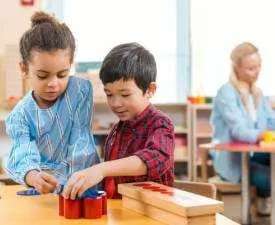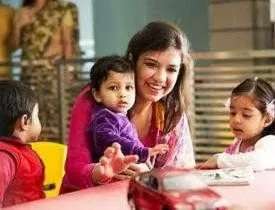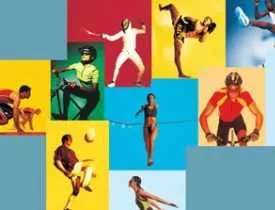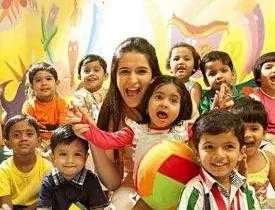Description
Course Name: Diploma in Montessori & Child Education Teacher Training
Course Id: DM&CE/Q1001.
Education Qualification: 12th Pass.
Duration: 370 Hrs.
How You will Get Diploma Certificate:
Step 1- Select your Course for Certification.
Step 2- Click on Enroll Now.
Step 3- Proceed to Enroll Now.
Step 4- Fill Your Billing Details and Proceed to Pay.
Step 5- You Will be Redirected to Payment Gateway, Pay Course and Exam Fee by Following Options.
Card(Debit/Credit), Wallet, Paytm, Net banking, UPI and Google pay.
Step 6- After Payment You will receive Study Material on your email id.
Step 7- After Completion of Course Study give Online Examination.
Step 8- After Online Examination you will get Diploma Certificate soft copy(Scan Copy) and Hard Copy(Original With Seal and Sign).
Step 9- After Certification you will receive Prospect Job Opportunities as per your Interest Area.
Online Examination Detail:
- Duration- 120 minutes.
- No. of Questions- 60. (Multiple Choice Questions).
- 10 Questions from each module, each carry 10 marks.
- Maximum Marks- 600, Passing Marks- 40%.
- There is no negative marking in this module.
| How Students will be Graded: | ||
| S.No. | Marks | Grade |
| 1 | 91-100 | O (Outstanding) |
| 2 | 81-90 | A (Excellent) |
| 3 | 71-80 | A (Very Good) |
| 4 | 61-70 | B (Good) |
| 5 | 51-60 | C (Average) |
| 6 | 41-50 | P (Pass) |
| 7 | 0-40 | F (Fail) |
Benefits of Certification:
- Government Authorized Assessment Agency Certification.
- Certificate Valid for Lifetime.
- Lifetime Verification of Certificate.
- Free Job Assistance as per your Interest Area.
Syllabus
Diploma in Montessori & Child Education Teacher Training
Principal of Montessori Teacher Training
Principles of Montessori Education: Free Learning and Health: Free Learning: Definition, meaning: Health-improving their health and wellbeing; Teaching children to have sense of control; Freedom control; Free decision making-improving the skill; sensitize in work-Nature of work and time bound work, Congenial Learning Environment: Learning environment for Montessori Education; Effective learning in congenial atmosphere; Environment promotes development on child, Group Learning, Cognition and Learning by Doing, Teacher is a Guide, Relationship of cognitive and physical activities; Physical classroom environment is not for learning – learning is for physical classroom – Enhancement of Learning, Negligence of Teacher and Text in child learning – Montessori programmes; Classroom learning with objects and action; Predicting the children’s interests, knowledge enhancement to promote learning skills – social skills, – traditional attitudes and authoritarian attitude.
Pedagogical Aspects and Approaches in Montessori Education
Methods and approaches in Montessori education, Life Activity Method: Practical life activities – Child Promotes activities and learn to Interact with environment; Real life projects – Promote five Motor skills, Concentration of mind and Independent nature (transferring, sorting, Personal hygiene, grooming, Dusting and sweeping), Language and Mathematical Learning Activity Method, Cultural and Mental Activity Method (Learning), Geographical, astronomical, artistic, Musical Learning enhance cultural activities; Multicultural activities expressing to the global culture, Motor Skill – Sensory Skill Approach, Experience- Vocabulary cum Storytelling – Reading Approach, Performance of Real nature and action before artificial one; Grasping ability; Pleasurable Reading; Narrative Interaction, Sensorial Experience Approach: Memorization and recognition of objects; Manipulation of letters and constructing words; Recognize and matching the Words – Secret Words, Action Words.
Developing Teaching Competency in Montessori Education
Familiarity with teaching competency, Motivation: Level of Motivation; Motivational environment; Dynamic classroom activity; Effective involvement and effective teaching is pursued in class room – simplification, enthusiastic participation and sensibility to children’s needs, Preparation: Careful planning and competent performance; well preparation; Cherished of presentation and positive emotional impact; Intellectual Excitement; Acquisition of basic teaching skills; Associated with student learning – Habit of reflective practice – new direction for pursuing the performance – Self correction, self-confident, self-direction and self-evaluation, Personal Philosophy Developing self-competency; promoting self-esteem; value characterized activities, Interpersonal Rapport: Social climate; Socialization; Social relationship; Developing prosaically behavior, congenial classroom climate Open, Warm and non-authoritarian attitude, Emotional Intelligence and Professional Competency: Teachers emotional intelligence – competency; (Sensitivity and Maturity) Teaching competency – Developing capacity to elicit varieties of stimuli in different environment; sensitivity- Identifying and expressing feelings .
Child Psychology and Health Education
Understanding the Child: effective guidance and nurturing the child – growth and mature; child and unique personality traits (consistent throughout the life); professional advantage of teachers in Montessori school-observing child activities, Understand the Children’s Consistent Traits, Child Development in Montessori Education: co-ordination, concentration and independency at the early age; role model to protect community – freedom within the Boundary – active seekers of knowledge – self-correction, self– introspection and self evaluation; integral part of Montessori classroom approach, Society and Child Psychology, Health Education, Child psychologist Domain of Service in Montessori School Interpersonal communication; accountability; decision making; collaborative ability and consultation.
Family and Child Life Education
Family and Family Life Education: Family Life Education: Definition, aims and objectives, value education; value transformation; value oriented education; Family as a custodian of Transmitter of values; social functions of family, Family Relationship and Child Life: Mothering; Fathering; love oriented Discipline; Child rights to Healthy Parental Attitude; Parental Responsibility; Social functions of the family; Education toward Justice; Guidelines for parents and teachers to maintain relationship with child, Child Development and Sensorial Activities Exploration of world around child through senses; Child development – Physical and Mental Exercises; Discrimination of contrast; Child’s capacity to define the Quality – Color, Weight, Shape, Texture, sound, etc, Adolescent and Personality Development: Child Care and Responsible Parenthood, Adolescence: meaning of life; Goal of life; Personality development; Emotions and activities of Adolescents; behavior pattern of Adolescents; Role of Teachers and Parents in shaping and guiding Adolescence, Stage of child development; Responsible parenthood; Working mother and child care; Child Diet and Diet for Adolescent to maintain Health in a family.
School Management
Responsible for Running of an Institution, School Management: A Dead School and A Living School: A Good Headmaster, Creative and Hardworking, Efficient Teachers, Creative, The Student Community, Provide Efficient Social Life and also Prepare in Art of ‘Living Together’, Bring School and Community Closer to Each Other, Help Pupils in the Unfolding and Blossoming of their Personality, Enable student to Right Type of Philosophy of life, Help in Realization of Objectives of Education laid Down Bt Experts, Bring Harmony Between Plans And Tasks, Planning, Organizing, Staffing, Budgeting, Recording and Reporting, Direction, Co-Ordination and Controlling.








Reviews
There are no reviews yet.